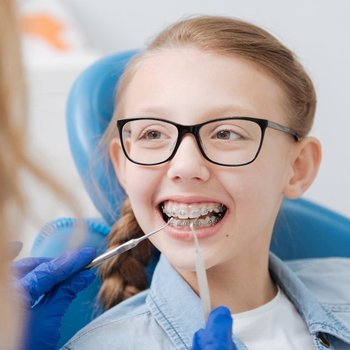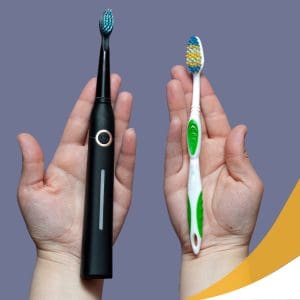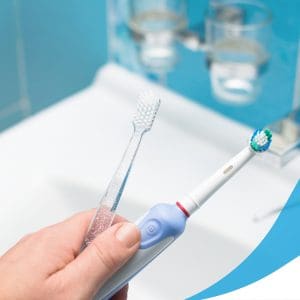Brushing your teeth is a fundamental part of your daily oral hygiene routine. However, with the vast array of toothbrush options available, choosing the right one can be a daunting task. The most significant decision often boils down to whether to use a manual or an electric toothbrush. Both types have their benefits and drawbacks, and understanding these can help you make an informed choice that best suits your dental needs.
Manual Toothbrushes: Classic and Simple
Manual toothbrushes have been around for centuries, and they’ve evolved significantly in terms of design and effectiveness.
Pros:
- Affordability: They are inexpensive and widely available.
- No Need for Power: You don’t need to charge them or replace batteries.
- Control: Some people prefer the feeling of control they have with a manual toothbrush, especially when it comes to the pressure applied and the brushing angle.
- Travel-Friendly: They’re easy to pack and carry, with no need for chargers or adapters.
Cons:
- Technique-Dependent: The effectiveness largely depends on your brushing technique, which can be a drawback if you’re not as diligent.
- No Built-In Timer: Unlike many electric models, manual toothbrushes don’t have timers to guide brushing duration.
- Potentially Less Effective for Some: People with limited mobility in their hands, such as those with arthritis, may find it challenging to use manual toothbrushes effectively.
Electric Toothbrushes: Technology-Driven Cleaning
Electric toothbrushes have gained popularity for their advanced features and ease of use.
Pros:
- Efficiency: They are generally more effective at removing plaque, thanks to their rapid bristle movements.
- Ease of Use: They do most of the work for you, which can be beneficial for people with limited manual dexterity.
- Built-In Timers: They often include timers to ensure you brush for the recommended two minutes.
- Fun for Kids: Many children find electric toothbrushes more fun to use, which can help establish good oral hygiene habits early.
Cons:
- Cost: Electric toothbrushes are more expensive than manual ones, and they require replacement heads and, occasionally, batteries or charging.
- Fragility: They can be more fragile and less convenient for travel due to their bulkier size and the need for a power source.
- Maintenance: You need to regularly charge them or replace batteries.
Making the Right Choice
When deciding between a manual and an electric toothbrush, consider the following factors:
- Oral Health Needs: If you have specific oral health issues, like gum disease or plaque buildup, an electric toothbrush might be more effective.
- Budget: If cost is a concern, manual toothbrushes are a budget-friendly option.
- Personal Preference: Some people simply prefer the feel of one type over the other.
- Lifestyle: Consider your lifestyle, including travel frequency and morning routines.
- Dexterity and Mobility: For those with arthritis or other conditions that affect hand mobility, an electric toothbrush can be a more comfortable and effective choice.
Schedule a Dental Exam
Both manual and electric toothbrushes can be effective in maintaining good oral hygiene as long as they are used properly. The best toothbrush for you is one that fits your personal needs, preferences, and lifestyle. Regardless of the type you choose, remember to replace your toothbrush or electric brush head every three months, brush for two minutes twice a day, and maintain regular dental check-ups. By considering these factors, you can ensure that your toothbrush choice is the right one for your dental health journey. While brushing is an important factor for oral hygiene, regular dental exams are crucial for optimal oral health. Schedule an appointment for your next checkup with our Davie, Plantation, or Tamarac dentists today!
January 19, 2024

 Adult
Adult




